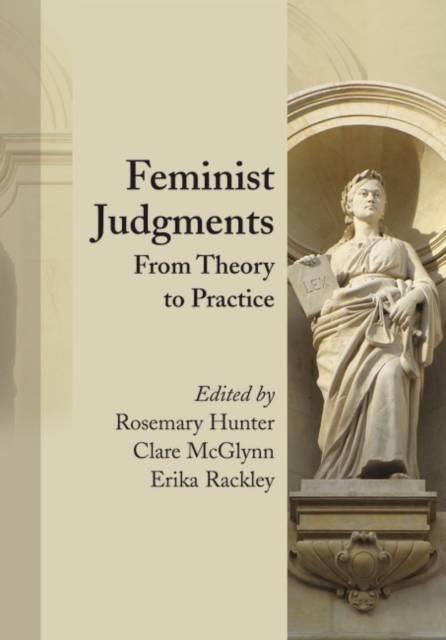
- Retrait gratuit dans votre magasin Club
- 7.000.000 titres dans notre catalogue
- Payer en toute sécurité
- Toujours un magasin près de chez vous
- Retrait gratuit dans votre magasin Club
- 7.000.0000 titres dans notre catalogue
- Payer en toute sécurité
- Toujours un magasin près de chez vous
52,95 €
+ 105 points
Description
While feminist legal scholarship has thrived within universities and in some sectors of legal practice, it has yet to have much impact within the judiciary or on judicial thinking. Thus, while feminist legal scholarship has generated comprehensive critiques of existing legal doctrine, there has been little opportunity to test or apply feminist knowledge in practice, in decisions in individual cases. In this book, a group of feminist legal scholars put theory into practice in judgment form, by writing the 'missing' feminist judgments in key cases. The cases chosen are significant decisions in English law across a broad range of substantive areas. The cases originate from a variety of levels but are primarily opinions of the Court of Appeal or the House of Lords. In some instances they are written in a fictitious appeal, but in others they are written as an additional concurring or dissenting judgment in the original case, providing a powerful illustration of the way in which the case could have been decided differently, even at the time it was heard. Each case is accompanied by a commentary which renders the judgment accessible to a non-specialist audience. The commentary explains the original decision, its background and doctrinal significance, the issues it raises, and how the feminist judgment deals with them differently.
The books also includes chapters examining the theoretical and conceptual issues raised by the process and practice of feminist judging, and by the judgments themselves, including the possibility of divergent feminist approaches to legal decision-making.
From the foreword by Lady Hale
'Reading this book ought to be a chastening experience for any judge who believes himself or herself to be both true to their judicial oath and a neutral observer of the world... If lawyers and judges like me have so much to learn from reading this book, then surely other, more sceptical, lawyers and judges have even more to learn...other scholars, and not only feminists, must also be fascinated by the window it opens onto the process of judicial reasoning: not the straightforward, predetermined march from A to B of popular belief, but something altogether more complicated and uncertain. And anyone will find it a very good read.'
The books also includes chapters examining the theoretical and conceptual issues raised by the process and practice of feminist judging, and by the judgments themselves, including the possibility of divergent feminist approaches to legal decision-making.
From the foreword by Lady Hale
'Reading this book ought to be a chastening experience for any judge who believes himself or herself to be both true to their judicial oath and a neutral observer of the world... If lawyers and judges like me have so much to learn from reading this book, then surely other, more sceptical, lawyers and judges have even more to learn...other scholars, and not only feminists, must also be fascinated by the window it opens onto the process of judicial reasoning: not the straightforward, predetermined march from A to B of popular belief, but something altogether more complicated and uncertain. And anyone will find it a very good read.'
Spécifications
Parties prenantes
- Auteur(s) :
- Editeur:
Contenu
- Nombre de pages :
- 504
- Langue:
- Anglais
Caractéristiques
- EAN:
- 9781849460538
- Date de parution :
- 30-09-10
- Format:
- Livre broché
- Format numérique:
- Trade paperback (VS)
- Dimensions :
- 168 mm x 241 mm
- Poids :
- 861 g

Les avis
Nous publions uniquement les avis qui respectent les conditions requises. Consultez nos conditions pour les avis.






